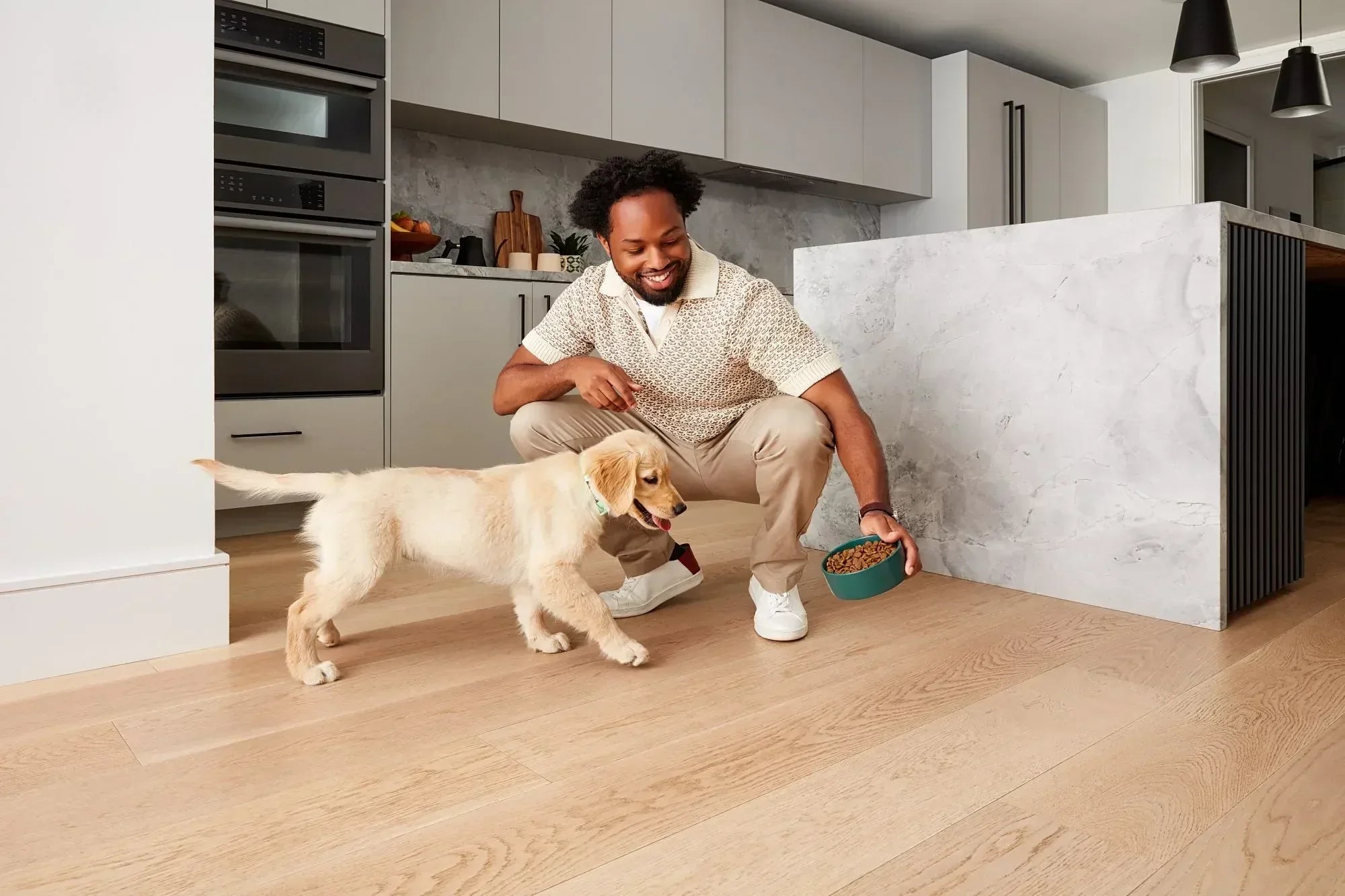Dealing with dog diarrhea isn’t fun—for you or your pup. But it’s something almost every dog parent will face.
Before you decide what to feed a dog with diarrhea, it’s important to understand what might be causing it. From food sensitivities to stress or scavenging, the source of the issue can guide how you treat it—and what ends up in their bowl.
Causes of Diarrhea in Dogs
When your dog has diarrhea, the first thing you probably wonder is:
“What did they eat?”
In reality, diarrhea can have lots of causes—ranging from dietary changes and food sensitivities to parasites, viruses, stress, or even just picking up something off the street.
Certain human foods can also trigger an upset stomach. If your pup tends to beg for scraps, it’s a good idea to keep this ASPCA list of people foods to avoid feeding your pets bookmarked.
If your dog has an upset stomach, don’t panic. Watch how the symptoms progress and note any changes in their behavior. Make sure they have plenty of fresh water to stay hydrated.
You may want to give them a break from their usual food or switch to a bland diet (more on that below) to help their system recover.
If symptoms don’t improve in a day or two—or if they worsen—schedule a vet visit to rule out anything more serious.
Reducing Food For Dogs With Diarrhea
When your dog’s digestive system is off, one of the best ways to help them recover is to temporarily reduce or pause food intake.
Many vets recommend starting with a bland diet because it’s gentle on the stomach and less likely to make symptoms worse. In some cases, withholding food for 12–24 hours (while continuing to provide water) gives the gut time to rest.
Always talk to your vet before fasting your pup—especially if they’re very young, elderly, or have other health concerns.
Once your dog is ready to eat again, reintroduce food slowly. Begin with a small amount of bland food to see how their body reacts. This gradual approach can help avoid re-triggering diarrhea and makes it easier to spot any ingredients that may be causing the issue.
The 7 Best Foods For Dogs With Diarrhea
So, wondering what to feed dogs with diarrhea? Here are the top 7 foods to try out.
1. Lean Proteins (Boiled Chicken, Turkey, or Ground Beef)
Lean, cooked proteins like plain boiled chicken, ground turkey, or lean ground beef are easy to digest and help rebuild strength during recovery.
Just make sure there’s no seasoning, skin, bones, or added fats—your dog’s stomach needs a break from anything heavy. Stick to small portions to start, and gradually increase if symptoms improve.
2. White Rice and Other Simple Carbs
White rice is gentle on the stomach and can help firm up stools. Other options like plain white potato or rice noodles may also work in moderation.
Our Salmon and Sweet Potato Kibble with Brown Rice features both rice and sweet potato—two gentle, digestion-friendly ingredients ideal for dogs recovering from diarrhea.
3. Potatoes
Cooked potatoes, including sweet potatoes, are starchy carbs that are easy for dogs to digest. They also offer fiber to help firm up stools and support recovery from diarrhea.
Always cook potatoes thoroughly—never serve them raw, as they contain solanine, which is toxic to dogs.
4. Pumpkin
When you search “how to stop dog diarrhea,” canned pumpkin is usually a top result—and for good reason. It’s high in fiber and packed with natural prebiotics that support healthy gut bacteria.
Just be sure it’s 100% pumpkin, with no added spices or sugar, which could delay recovery.
You can mix a spoonful into their regular food if the stomach issue is mild.
When your pup is ready for treats again, try our easy-to-digest Pumpkin and Salmon Jerky!
5. Oatmeal
Oatmeal is another gentle food that can help firm up your dog’s stools. It’s rich in soluble fiber and easy on the stomach when served plain.
Just cook it fully in water—skip the milk, sugar, or flavorings.
6. Carrots
Boiled carrots offer fiber and vitamins that support your dog’s digestive recovery.
Our Organic Grain-Free Chicken Dog Food With Carrots Kibble is great for incorporating carrots into your dog’s everyday nutrition and as an option to support digestive health—especially when your dog’s system is off.
7. High-Quality Dog Food
Even when your dog has diarrhea, a clean, gut-friendly diet can support their digestive recovery.
Look for limited-ingredient or grain-free recipes, or try a novel protein if your pup has potential food allergies.
Jinx offers dog food made with premium proteins, 20+ superfoods, and probiotics—designed to support healthy digestion daily even with sensitive dogs.
What is the best dry dog food for diarrhea?
If your dog is dealing with diarrhea and you’re not sure what kibble is safe to serve, look for a dry dog food that’s made with limited ingredients and easily digestible proteins like salmon or turkey.
Avoid foods that include chicken (a common allergen), artificial additives, or vague ingredient terms like “animal meal” or “by-product.”
Jinx offers a variety of chicken-free dry dog food options that support sensitive stomachs. Our Salmon, Brown Rice & Sweet Potato Recipe is made with lean protein, over 20 natural superfoods, and probiotics to help support gut health from bowl to belly.
What is the best wet dog food for diarrhea?
If your dog has diarrhea, the best wet dog food will be low in fat, easily digestible, and made with gentle ingredients like boiled chicken or pumpkin. These foods help soothe the digestive system without overloading it.
Avoid wet foods that contain fillers, artificial additives, or fatty ingredients, which may worsen the condition.
What is the best puppy food for diarrhea?
If your puppy has diarrhea, choosing the right food can help soothe their stomach and support recovery. The best puppy food for diarrhea is bland, easily digestible, and low in fat.
Boiled chicken and white rice, plain cooked pumpkin, or a vet-recommended bland diet are all safe short-term options.
Make sure your puppy stays well hydrated, as dehydration can happen quickly at this age. If diarrhea lasts longer than 24 hours—or comes with vomiting, lethargy, or other concerning symptoms—contact your veterinarian.
Feeding Through the Not-So-Fun Days
Diarrhea in dogs is common—but that doesn’t make it less stressful. The right diet can go a long way in helping your dog (or puppy) feel better, faster.
Whether you’re reaching for bland basics like rice and boiled chicken or exploring chicken-free kibble designed for sensitive stomachs, gentle, digestible ingredients are key.
And remember: if symptoms persist for more than a day or worsen, don’t wait—check in with your vet for guidance.
At Jinx, we’re all about clean nutrition that supports dogs in real life—including the messy moments. Explore our collection of limited-ingredient recipes, digestive toppers, and easy-to-serve meals to support your dog’s health at every stage.
Frequently Asked Questions
Can I feed my dog during diarrhea, or should I wait?
It depends on the severity. For mild cases, bland foods like boiled chicken and white rice are often safe to feed right away. In more severe cases—or if your vet recommends it—you may want to pause food for 12–24 hours while keeping your dog hydrated.
What ingredients help soothe a dog’s stomach?
Boiled chicken, white rice, pumpkin, bone broth, and plain cooked veggies (like carrots or sweet potatoes) are commonly recommended. These foods are gentle, digestible, and help firm up stools.
Should I avoid chicken in dog food if my dog has diarrhea?
Not always—but if your dog has a chicken sensitivity, it can make things worse. If in doubt, go for a chicken-free dog food with limited ingredients and easily digestible proteins like salmon or turkey.
What’s the best dog food brand for sensitive stomachs?
Look for clean, limited-ingredient recipes made without artificial fillers or common allergens. Jinx offers chicken-free kibble, digestive toppers, and probiotics to support dogs with sensitive stomachs.

